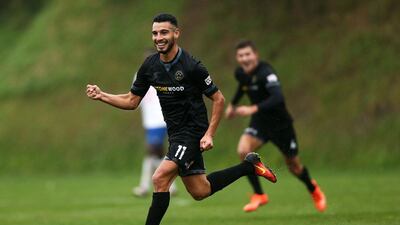Back in Argentina in 2000, not long after his 11th birthday, Mario Barcia watched on television with his father as Boca Juniors defeated Real Madrid in the Intercontinental Cup to record a famous victory.
Now, Barcia could play against both in the UAE. In the space of four days.
“Yeah it’s just a dream,” he says by telephone from New Zealand, shortly before his Team Wellington set off for the Emirates ahead of Wednesday’s 2018 Fifa Club World Cup opener against Al Ain. “Every night I’m going to sleep I’m dreaming of everything: what’s going to happen, dreaming about playing with the biggest teams in the world.
"It’s such a great feeling; amazing. It’s something I’ve been looking to do for the past few years.”
Maybe much longer. Barcia’s route to the Club World Cup, the rebranded Intercontinental Cup, has been anything but conventional. A talented midfielder with ambitions of making it in professional football, he left his home in Santiago del Estero to the north of Argentina age 12, joining Newell’s Old Boys the year after Lionel Messi had departed for Barcelona.
He spent time playing in the Bolivian first division, then in the Argentine second tier, before a compatriot coach emailed to say he had seen videos of Barcia on YouTube, and invited the player to join him in New Zealand.
So Barcia left home again, without friends or family, armed with only his suitcase. His English non-existent, he lived in hostels to learn the language, mixing with Europeans, reading newspapers, watching movies with subtitles. Pop music helped speed the process.
Five years later, and now fluent, Barcia reflects on a journey he hopes concludes with a dream tie against a true football heavyweight in the UAE.
“Yeah, it’s been tough,” he says. “At the start it was really difficult. But Team Wellington are amazing, such a great club, so I’m so happy with my decision. And here I am.”
He’s certainly arrived. In a few days, Wellington take on UAE champions Al Ain at the Hazza bin Zayed Stadium, where both clubs make their Club World Cup debut. The winner goes on to face Tunisia’s Esperance de Tunis, the freshly minted African champions, in the quarter-finals, before a potential last-four clash against whoever prevails in Sunday’s rescheduled second leg of the Copa Libertadores final.
Either Boca Juniors or River Plate await. For an Argentine with a Boca-mad father, it's pretty tantalising.
“For us, as Argentinians, the whole Club World Cup means a lot,” Barcia says. “For every single team in Argentina, the Club World Cup is really important. And for me, being Argentinian, all I want is to play against an Argentinian team.
“And I’m working really hard to play against one of the best teams in Argentina. It could be Boca Juniors or River, but it doesn’t matter to me – I’d just love to play against one. But before that we have to win two games. I’m very sure and confident we can do that.”
Still, it would represent quite the feat. Wellington are semi-professional, with the majority of their players working part-time jobs to help fund their football. For instance, Barcia coaches football to children now, but at various times worked on a building site, and for a removal company.
Wellington booked a first appearance at the Club World Cup by defeating Fiji’s Lautoka 10-3 on aggregate the Oceania Champions League final in May. Runners-up the previous three years - they lost each time to domestic rivals Auckland City - finally they had made it.
______________
Read more:
Lowdown: All you need to know about the Fifa Club World Cup in Abu Dhabi
Marcus Berg: Fifa Club World Cup can wait as Al Ain focus on President's Cup opener
Carlos Salcido: Guadalajara captain targets 'dream' clash with Real Madrid at Club World Cup
Roberto Carlos: Winning the Fifa Club World Cup 'the pinnacle of club football'
______________
And, although Barcia maintains Al Ain form the focus – he researched early by watching their matches on YouTube and cites Sweden striker Marcus Berg as his side's main threat – Auckland's barely believable run to the 2014 Club World Cup semi-final provides real optimism.
“It’s possible,” Barcia says. “Today in football, as you’ve seen in Spain or in England, any team can beat any team. It’s possible we can make some history. You just need to work really hard for it, and just believe in your team and in yourself that you can do it.
“At the end of the day, on the field it’s 11 against 11. Anything can happen... anything. We’re in a great position, but Al Ain is all we’re looking at. It’s the game we have to win, and I’m pretty confident we can beat them. We’ll be doing everything to do that. So let’s see what we can achieve.”
And, then, who knows? Maybe his Dad will be getting up even earlier again back home in Argentina, just like he did in 2000, when Martin Palmero scored twice against Madrid and Juan Roman Riquelme, one of Barcia’s favourite players, “was just having fun on the pitch”.
After all, he’s allowed to dream.
“If you said when I was a kid watching the same tournament that I would be playing, I wouldn’t believe it. Now I can’t believe it. Sometimes I think ‘ah, I’m going to the World Cup’, but I don't believe it. I can’t wait. I really can’t wait.”


